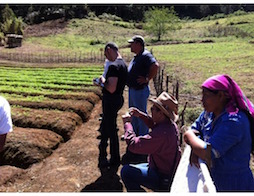Participatory Monitoring and Evaluation (PM&E) is a method for engaging project stakeholders in designing and implementing M&E systems, such as indicators. It is an alternative to top-down foreign assistance, in which the donor organization might pre-determine indicators without input from target stakeholders. PM&E can enable active participation and buy-in of targeted stakeholders, rich learning between implementers and stakeholders, and M&E capacity enhancement for target stakeholders. PM&E thus facilitates evidence-based foreign assistance that builds local capacity in close partnership with target stakeholders.
SSG Advisors (SSG), a woman-owned, 8(a), and HUBZone-certified small disadvantaged business, has recently undertaken a pair of research activities related to PM&E in Central America. These activities have included indicator development with U.S. Department of State (DOS) project managers throughout the region and indicator testing with agricultural cooperatives in Guatemala. This experience has provided valuable insight into effective participatory research and program design.
SSG helped develop DOS Central America Regional Security Initiative (CARSI) indicators for police professionalization, justice sector strengthening, counter-narcotics assistance, and gang prevention programs across Belize, Costa Rica, El Salvador, Guatemala,  Honduras, Nicaragua, and Panama. SSG interviewed approximately 25 DOS PMs, the target stakeholders for this activity, to understand objectives and current indicator use in the field, then worked with the project managers to develop, refine, and finalize project indicator lists. After developing approximately 500 project-specific indicators for project managers, SSG worked with program stakeholders in Washington, DC to identify about 90 priority indicators for incorporation into the regional M&E system.
Honduras, Nicaragua, and Panama. SSG interviewed approximately 25 DOS PMs, the target stakeholders for this activity, to understand objectives and current indicator use in the field, then worked with the project managers to develop, refine, and finalize project indicator lists. After developing approximately 500 project-specific indicators for project managers, SSG worked with program stakeholders in Washington, DC to identify about 90 priority indicators for incorporation into the regional M&E system.
In Guatemala, SSG supported the U.S. Agency for International Development (USAID) in identifying, testing, and proposing priority indicators to measure the financial health and patronage value of agricultural cooperatives. SSG employed PM&E principles in determining the criteria by which to prioritize different metrics, namely the benefit and feasibility of using each indicator from the cooperatives' perspective. SSG also focused on understanding the objectives and performance measurement practices of each cooperative, and on obtaining cooperative feedback on the indicators identified through desk research. This participatory approach enabled SSG to ground truth the indicator prioritization, take into account cooperatives' M&E capacity, and propose indicators that the target stakeholders would find practical and, therefore, be more likely to use.
M&E must involve not only the stakeholders collecting and providing performance data, but also stakeholders reviewing and processing the data. By designing hundreds of country-level CARSI indicators with field-based project managers, then synthesizing that list into a shorter list of priority indicators for regional use with Washington, DC stakeholders, SSG was able to incorporate both field and headquarters perspectives. Rather than focusing solely on the local perspective, that is, PM&E practitioners should not neglect the donors themselves as important stakeholders to engage in a participatory fashion.
When developing PM&E tools, simplicity and flexibility is key. Prior to data collection in Guatemala, SSG developed an indicator-testing questionnaire in Spanish for agricultural cooperatives. This questionnaire involved 1-5 rating scales across multiple criteria for various highly technical indicators derived from the worlds of corporate finance and academia. In the field, the questionnaire quickly proved overly complex, as most cooperative interviews included smallholder farmers with minimal literacy and command of Spanish. SSG therefore adapted key survey themes to simply worded questions within a semi-structured interview format. This format proved more participatory and effective, as the questions were more intelligible to the target stakeholders, who, rather than selecting from a pre-determined indicator list, proposed measurements that were most useful and usable for cooperatives. This approach encouraged local buy-in, as cooperative stakeholders helped determine the indicators by which their enterprises would be evaluated, and, by extension, the types of support that the donor would be providing.
These lessons will hopefully benefit small businesses exploring PM&E in Latin America and elsewhere. Further dialogue would also be welcome, as the last comprehensive review of regional PM&E efforts was published 16 years ago. For instance, it is interesting to consider if PM&E in Latin America might differ from other regions. SSG concurrently employed the indicator testing method from Guatemala with cooperatives in Kenya and our experience there revealed methodological similarities across geographies. That said, given that the World Economic Forum has found that human capital in Latin America is more comparable between countries than in other regions, it is worth considering the extent to which this region may be ready for greater, more standardized investment in participatory indicator development in the future.







